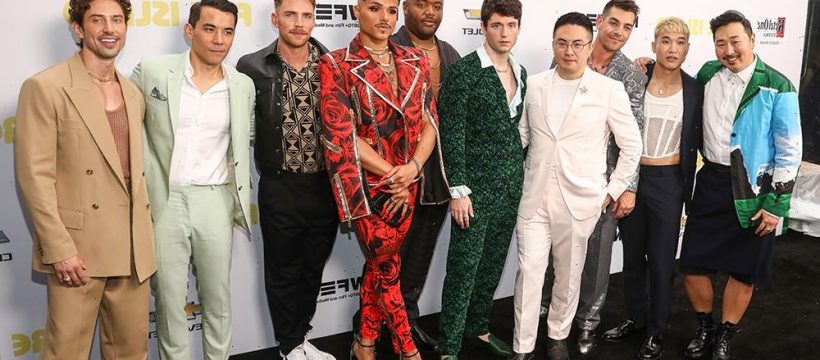On Wednesday evening in New York City — about 60 miles and a ferry ride away from its subject— “Fire Island,” Joel Kim Booster’s romantic comedy about a weekend spent in New York’s chosen queer haven, held its premiere at the SVA Theatre.
On 23rd Street in Chelsea, guests including Alok Viad-Menon, Jackie Cox, Peppermint and John Cameron Mitchell, as well as stars Bowen Yang, Matt Rogers, Conrad Ricamora and James Scully assembled to celebrate the film as part of New York’s NewFest Pride. You could have lifted the premiere’s guest list from any summer weekend spent at the Pines, something to be celebrated for a new film distributed by a gatekeeper studio like Searchlight Pictures.
“Fire Island has had a long history of being a safe haven for closeted queer people in the city to be themselves,” director Andrew Ahn told Variety at the premiere. “Not unlike this.”
The film features a group of gay Asian men, led by Booster and Yang, who head to the Pines for a final summer weekend before their host (played by Margaret Cho) sells her beach house. There, the plot points of a classic romantic comedy — as well as “Pride & Prejudice,” which Booster adapts to model the Pine’s sexual caste system — is born out, as well as the issues of racism, classism and sexual assault which continue to plague Fire Island’s sequestered beach destination.
“The film doesn’t sugarcoat the Fire Island experience, and Joel has talked about how many moments of the film are lifted from his own experiences,” Ahn continued. “I love rom-coms, and there’s something about them that allows us to process the difficult emotions around being desired that, without a sense of humor, would be crushing.”
True, queer stories are yet deserving of levity. Often they’re framed around violence and sadness, and “Fire Island” is defiant against that trope. Still, as a gay romantic comedy, “Fire Island” must contend with the inevitable scarcity of its genre.
“The arts are structured in a capitalist way where, in order to break through, we have to be acceptable,” “Saturday Night Live” star Yang told Variety. “It’s why we are often forced to play our own stereotypes, even in films made by queer people.”
“This film,” he explained, “is about whatever queer people’s preconceived notions are about each other. By modeling the film after ‘Pride & Prejudice’ we can make a commentary about our tropes. It becomes a comedy of manners, a social ethic.”
Even so, it’s difficult not to levy the weight of an entire community — or at the very least, New York’s queer community — on “Fire Island.” As Booster explained to Variety at the premiere, it can be unduly difficult to enjoy one film for what it is and isn’t when queer audiences are given only a handful of selections each theatrical season.
“I take the responsibility of being one of the few mainstream gay movies very seriously. I thought about this a lot while we were shooting. Andrew would tell me a constant refrain: ‘We can’t make this movie for Twitter. The discourse will be what the discourse will be.’ I didn’t set out to represent our entire community, and I think that’s a fool’s errand to try.”
This year, the summer will see just one other film in “Fire Island’s” archetype, Universal Pictures’ “Bros,” which bills itself as the first gay romantic comedy to be released by a major motion picture studio. (“Fire Island,” while distributed by Searchlight, was produced by Jax Media.) “Bros” stars and was created by Billy Eichner, Booster’s former boss as writer on “Billy on the Street.”
“I’m genuinely so happy that Billy’s movie is coming out,” Booster said. “If you don’t like this movie, you have options that are coming down the pike. The scarcity politics are becoming less of an issue.”
As “Fire Island” holds its premiere, there is reason to question why either film must be in conversation with the other, Booster offered.
“I think we’ll have reached an amazing place in representation when people talk about his movie without bringing up mine,” he said. “There is an oppositional energy online, of people saying ‘Oh, ‘Fire Island’ looks like shit and ‘Bros’ looks amazing, or vice versa.’”
“We’ll really have reached the promised land,” Booster offered, “when that conversation doesn’t happen.”
Source: Read Full Article
